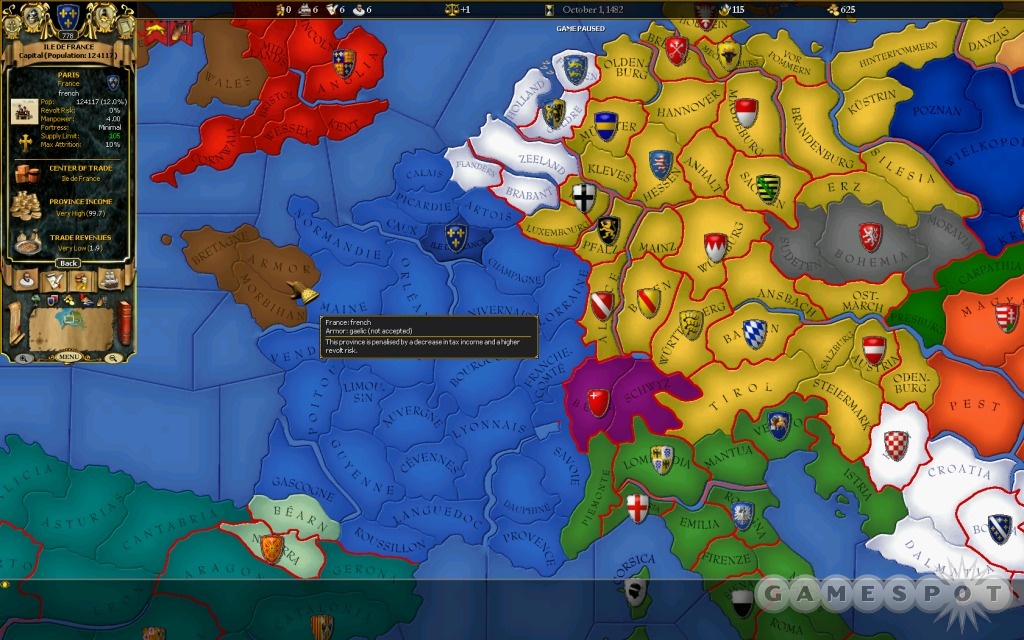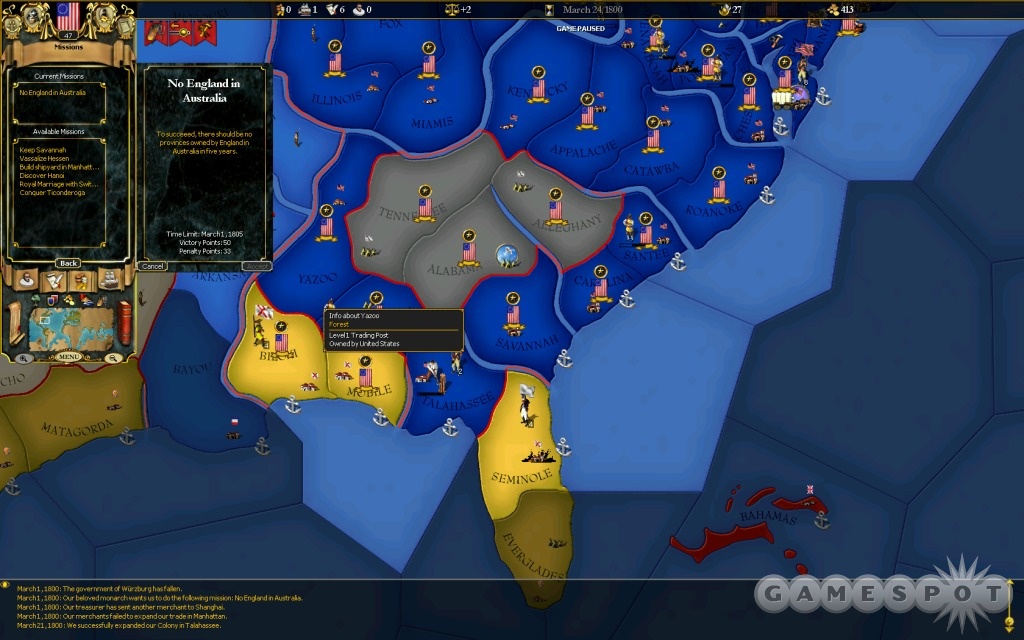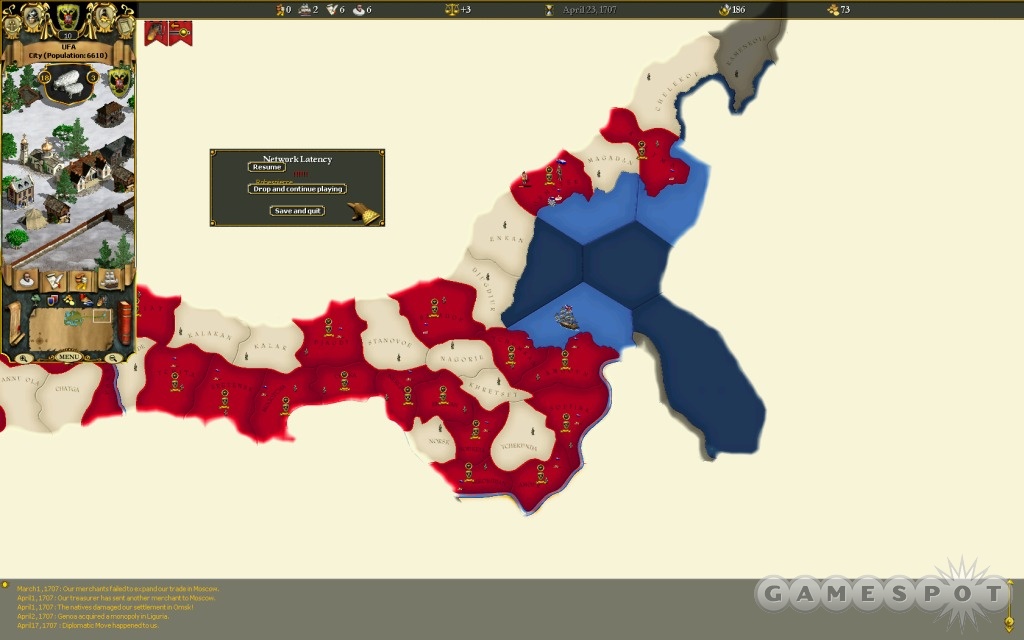The Europa Universalis series is the undisputed master of a niche genre so small that few serious competitors come to mind. After all, how many other series let you guide one of more than 100 countries through hundreds of years of human history (1419-1820) in real time on a detailed, Risk-style map of the world? While the original board game was too obscure to gain a sizable following, the video game series has inspired an impressive community of fans and modders, and For the Glory is the fruit of their labors. Best described as a stand-alone expansion for 2001's Europa Universalis II, this fan-developed title is essentially the same game with a few notable improvements; it's easier to learn and to play, the interface is slicker and more informative, and the graphics have been updated. Although a few of the annoying aspects of the original EUII remain, and multiplayer is remarkably unstable, For the Glory provides a great single-player experience, full of color, culture, and history.

Instead of focusing on military tactics like most real-time strategy games, For the Glory emphasizes grand strategy. As some sort of eternal power behind the throne, you have to consider religion, culture, scientific research, foreign and domestic policies, and the current monarch's strengths and weakness to guide your country to greatness (or ruin). Given that For the Glory is best suited to fulfilling alternate-history fantasies, victory tends to be subjective in this series. However, you can win in For the Glory by accumulating the most victory points, which you earn by completing missions. In contrast, failing a mission will cost you victory points. Missions consist of a variety of tasks, including building shipyards, discovering foreign lands, conquering territory, and improving relations with other countries. It's up to you which missions you undertake, unless you select the option that puts your monarch in control of those decisions. However, your monarch tends to choose poorly, so don't leave it up to him. For example, your sovereign may want you to kick the British out of Australia by 1800, when you're playing as the newly independent USA, or demand that you prevent Spain from colonizing the Caribbean, when you're playing as a tiny, landlocked country that can barely pacify its own countryside, much less take on King Carlos V.
Domestic concerns will take up the majority of your time in For the Glory. If you've conquered a diversity of peoples, your biggest domestic duty is to crush revolts. However, you'll find there is more to governing than peasant control. A sliding-scale system depicts your government's policies on a wide variety of issues, such as how innovative your country is, whether your military favors quantity or quality, and how much power the aristocracy has, all of which have tangible effects in-game. You can manually move one of these sliders (one interval out of 10) once every decade, so it will take a while to make radical changes. A second way to change your policies is through your choices in the historical and random events that regularly pop up, so always choose your response carefully when such opportunities arise. Another important concern is managing the budget, since it affects your troops' performance, how long research takes to complete, and how much money you have in the bank. Obviously, a positive treasury balance is a good thing, but be sure not to hoard too much money, because it causes inflation, which can become problematic if you don't keep it in check. Overall, the most important thing to budget for is your country's stability, which affects just about everything in the game. While instability is usually the result of your in-game actions, such as declaring war on a neighboring country without a reasonable cause, it can also be influenced by events. For instance, if a group of superstitious peasants sees a meteor, your realm may cross the low stability threshold beyond which your army perpetually losses its battles, rebels besiege your cities more often than normal, other nations laugh at your emissaries, and all your colonies turn out like Roanoke.
Once your domestic duties are in order, you can focus on statecraft. Artificial intelligence-controlled nations in For the Glory believe in maintaining the balance of power, so if you try to conquer a lot of land in a series of imperialistic wars, you may see grand coalitions form against you. Such an alliance eventually took down Napoleon, and it could bring you down as well, so you should consider the potential benefits of covering your iron fist with a velvet glove. For example, it's possible to convince other countries to pledge fealty to you, or even to allow themselves to be peacefully annexed into your realm. Such actions still tarnish your reputation, but not as badly as taking territory by force. If you do go to war, having a casus belli, or a "legitimate" justification, makes the war easier for your neighbors and subjects to swallow. While these justifications are usually generated through events, you can also use diplomacy to engineer one. For instance, you could arrange a royal marriage with a neighbor and then use that marriage as a pretext to claim their throne. When you aren't plotting "just wars" against your neighbors, you'll probably be busy trying to bribe them into liking you. The success or failure of such attempts, and all other diplomatic actions, is determined by your monarch's diplomacy skill. If your monarch has a silver tongue, then you can get whatever you want, but if he's an incompetent boor, your futile attempts to improve relations with foreign leaders will merely deplete your treasury.

When diplomacy fails, you can emulate distinguished statesmen like Genghis Khan and solve your problems on the battlefield. Although battles take place in real time, you won't have much control over the action. When you order an attack, your units first move into a province and fight it out. If they win, they move on to besieging the province's fortified garrison. Finally, once the garrison is destroyed, you occupy the province. However, occupation does not equal ownership in For the Glory. Instead, your enemy must agree to cede you the territory in a peace treaty, and the likelihood that they'll agree to your terms is determined by how much territory you occupy and how well your units fared in battle.
Combat is significantly tougher in For the Glory than in EUII for three primary reasons. First, terrain and weather are now extremely important, and as a result, a large and technologically advanced army can still lose battles against weaker defenders in harsh weather or on rugged terrain. Second, larger armies are more vulnerable to attrition casualties due to supply shortages in For the Glory. Weather contributes to attrition as well, so you may lose your grand army if you leave it in some Russian backwater in the middle of winter. Naval attrition is also a bigger concern, but thankfully fleets now automatically sail to the nearest friendly port when they start taking too many attrition losses on the high seas. Unfortunately, this makes whimsical invasions of Rome with hundreds of Chinese junks practically impossible. Finally, the AI puts up a much better fight in For the Glory than it does in EUII, having learned to concentrate its forces, rather than sending out puny armies for you to destroy piecemeal.

EUII offered a lot in the way of combat, strategy, and diplomacy, but it was never known for eye candy, and the graphics haven't aged well. For the Glory, however, makes several improvements in that regard. Several new and improved unit sprites have been added, the most notable of which are the revolting peasants who are now represented by pitchfork-wielding farmers rather than professional soldiers. Unfortunately, some of the original sprites still remain, which causes disappointing moments, such as when technological advances cause England's new longbowman sprite to be replaced by a drab sprite from 2001. Also, the city buildings and the map haven't received major face-lifts, but the 2D map and its board game feel do have a nostalgic appeal. Other welcome improvements include additional map modes: one that details the majority nationality in each province and another that tracks revolt risk. The greatest gameplay benefit of these additions is the ability to move your armies while in the political borders map mode, which EUII fans will undoubtedly appreciate.
In addition to the new visuals, For the Glory has improved on EUII's interface, providing more tooltips and useful new icons that notify you when peasants verge on rebellion, when truces with other countries are set to expire, and when creditors expect repayment. Another icon appears when province buildings are ready to be upgraded, and clicking on it takes you to the city management screen for the first eligible province. Improvements like these make For the Glory extremely user-friendly, and besides, an eternal puppet master (such as yourself) shouldn't have to search through complicated ledgers and personally inspect each province in order to exercise his or her power.
As for new content, For the Glory delivers thousands of new events, including random events, which can be triggered for any country, and historical ones, which are country-specific. The latter add a world of flavor to the game. For instance, events about building Versailles or the rise of Cardinal Richelieu make you feel like you are running France rather than "that big blue blob on the political map." Additionally, you'll find in-depth alternate-history event chains for situations such as an English victory in the Hundred Years' War or an early unification of Germany. Most of the new events are part of the Alternative Grand Campaign and Event Exchange Project, one of two EUII user-made modifications that are included with For the Glory. Unfortunately, AGCEEP isn't as stable as vanilla For the Glory and occasionally crashes to desktop, so save often if you decide to play it. The other included mod is a scenario focusing on Tamerlane, which will certainly appeal to fans of the Timurid Empire.
The new content and improvements are such welcome revisions to EUII that it's hard to understand why all of its imperfections weren't exorcised. Colonization, for example, is still a tedious affair. To colonize a province, you have to click the colonist button, click on the province that you want to colonize, and then wait to see if settlers are successful. Each successful attempt adds 100 people to the population of the colony, and you need at least 1,000 settlers in a province to turn your colony into a city. Why can't the computer be ordered to automatically send free colonists to a specific settlement until the population reaches 1,000? And why can't you send multiple colonists to a single province at the same time? Merchants are similarly disappointing. Although you can order the computer to automatically send your merchants to foreign centers of trade, you can't specify the areas on which it should focus. As a result, the computer may send your merchants to Malaya when you want to establish a monopoly in Flanders. Of course, you can send merchants manually, but that is about as much fun as colonization.

Another annoying holdover from EUII is the sound effects, the most grating of which are the construction sounds and the shrill trumpets heralding diplomatic offers. While the sound is mostly on par with EUII, the music is actually inferior. For the Glory uses EUIII's respectable, one-hour-long score, but EUII's soundtrack was top-notch, featuring 150 minutes of diverse and unforgettable folk tunes.
Missing from For the Glory is Valkyrienet, the multiplayer matchmaking server used in EUII. Consequently, your multiplayer options are limited mostly to local area network games, direct connection via IP address, or games arranged through a third party such as GameRanger. Moreover, if you do join a game, you're in for a serious disappointment. Multiplayer is plagued by so many crashes and latency issues that it's practically impossible to play with one friend over a LAN, much less up to 32 players over the Internet. While the very devoted may make their way through multiplayer campaigns by taking advantage of the ability to save and reload multiplayer games, that's no consolation to most of us, who'll find no joy in multiplayer in its current, buggy iteration.
Despite the supremely disappointing multiplayer experience, For the Glory manages to greatly improve upon Europa Universalis II. The visual improvements, better tooltips, helpful reminder icons, and thousands of new events make For the Glory superior to its venerable ancestor. Needless to say, fans of EUII should pick it up immediately, and Renaissance- and Napoleonic-era aficionados are in for a treat. However, given the availability of Europa Universalis III and its expansions, you may prefer to skip For the Glory in favor of the more stable and aesthetically pleasing experience. If you love the flavor of historical and alt-history events, For the Glory is the Europa Universalis may well be the game for you.